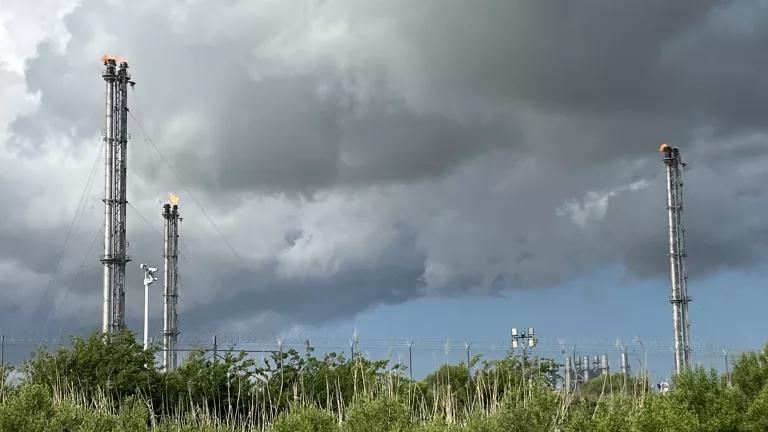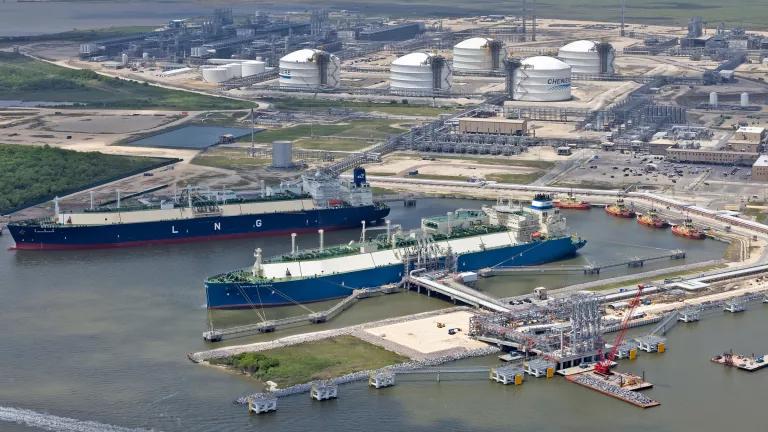
The SSE Hydro on the Scottish Event Campus in Glasgow, one of the venues for COP26
As President Joe Biden heads to Glasgow for critical climate talks, the United Nations (U.N.) has issued a report card of sorts on the state of global climate action. We’re failing—badly.
To keep the climate crisis from going catastrophic, carbon pollution and other greenhouse gas emissions must be roughly halved by 2030, globally, compared to 2010. Instead, the U.N. reports we’re on track for a 16 percent increase in greenhouse gases, with dire consequences to follow.
Leaders have no more urgent task in Glasgow than to get the global economy on track to phase out the dirty fuels and forest destruction driving the climate crisis and shift to cleaner, smarter ways to power our future and grow our food, while there’s still time to act.
With this imperative comes an extraordinary opportunity for leaders to advance prosperity, equity, and public health. That, too, is very much on the agenda.
Here’s what success in Glasgow will look like—and what President Biden can do to help achieve it.
To be clear: Glasgow won’t stop the climate chaos that’s turning croplands into deserts, swamping coastal communities with rising seas, contributing to global species collapse, and amping up heat waves, floods, and storms. The goal, though, must be to keep all this from getting worse, stabilize conditions going forward, and protect the most vulnerable populations suffering the brunt of climate hazard and harm.
Three touchstones will signal progress.
First, leaders must speed the global shift away from coal, oil, and gas by supporting investments in renewable energy, electric vehicles, energy efficiency, and power grid upgrades. Private analysts expect the clean energy transition to attract up to $30 trillion in global investment over just the next two decades.
This will create millions of jobs and stimulate growth in the economic play of our lifetime. Glasgow can help governments align their policies, standards, and incentives to both support this investment and help ensure the most effective and enduring impact possible on climate, jobs, and health.
Next, leaders must provide developing countries with the resources to help protect their people from the mounting costs and rising dangers of climate change and shift to clean energy.
Wealthy nations have promised $100 billion a year in this assistance but are falling about $20 billion short. Glasgow must ensure that developing countries receive what they’ve been promised: $600 billion over the coming six years.
Finally, leaders must chart a certain path forward so that we turn the promises made at Glasgow into the progress we need on the ground. That means monitoring carbon reductions and sharing the results so countries can learn from each other what works best and what more needs to change. It means ramping up ambitions when leaders gather again in 2022 to assess gains and strengthen their climate pledges. And it means holding each other to account for the commitments we make, to confront the existential challenge of our time.

People rally in front of the White House to demand that President Biden stop approving fossil fuel projects and declare a climate emergency on Indigenous Peoples’ Day, October 11, 2021
None of this will happen without leadership.
President Biden must restore lost trust in the United States as a reliable global climate partner. The Trump administration squandered that trust. Biden is working to earn it back.
His strongest card is to lead by example, showing how he’ll keep his promise to cut U.S. carbon emissions and other greenhouse gases by 50 percent to 52 percent, compared to 2005 levels, and get to 80 percent clean electricity by 2030.
Congressional and White House negotiators appear close to a grand bargain to enact Biden’s Build Back Better agenda, through bipartisan infrastructure legislation and a budget reconciliation bill. The result won’t be everything Biden sought, but the final package, pending congressional approval, will contain the biggest climate investment in history.
Combined with strong carbon pollution and efficiency standards—at the state, local, and national levels—and Biden’s whole-of-government approach to fighting climate change, enacting the Build Back Better agenda can set the table for the carbon reductions we so urgently need, while we stay focused on what more must be done.
No single event is a last, best chance to win the climate fight. We’ve come to a moment of reckoning, though, for each nation, and the world. We won’t end the climate crisis in Glasgow, but we must make meaningful and lasting progress in the long journey ahead.




